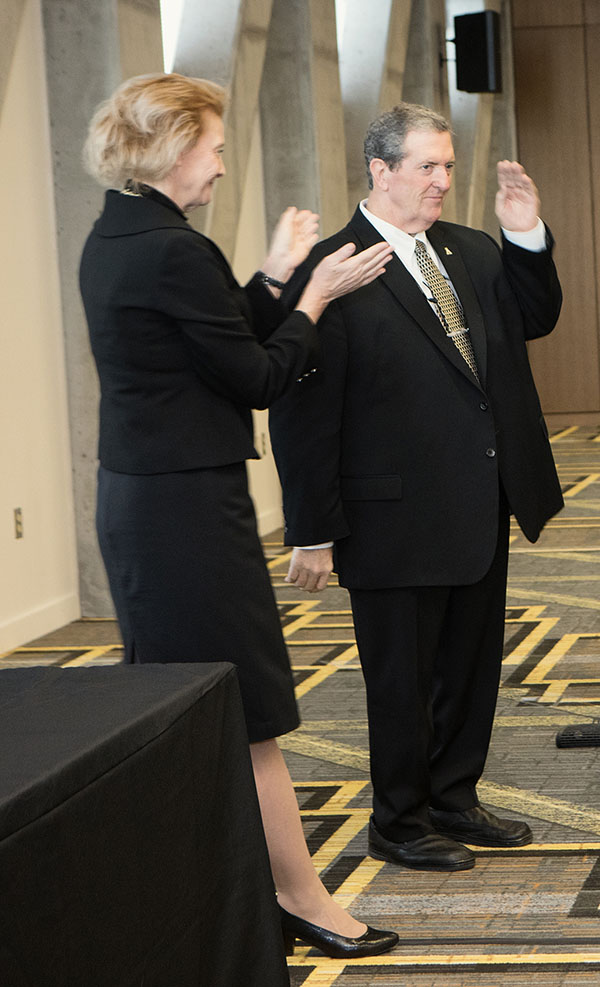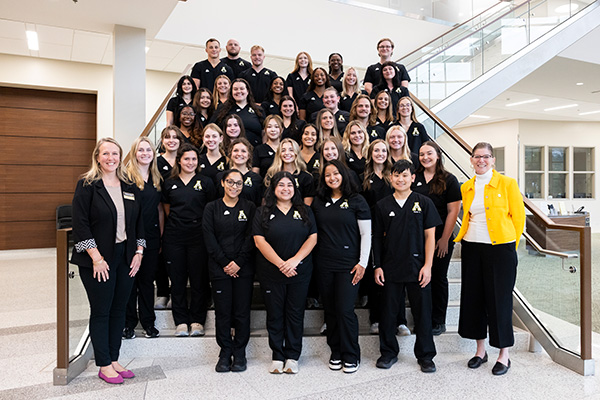
Dayton Cole was recognized for his years of service to Appalachian State University at the March 16 meeting of Appalachian’s Board of Trustees. Of Cole, Chancellor Sheri Everts said, “Dayton has dedicated the bulk of his career to supporting our students, faculty and staff. He has received numerous recognitions and honors for his dedication and professional activities.” Photo by Marie Freeman
BOONE, N.C. — In her remarks to the Board of Trustees at their March 16 meeting, Appalachian State University Chancellor Sheri Everts discussed new programs and progress toward meeting five-year strategic goals, and shared plans for capital expansion and improvements developed collaboratively as a campus and with the Boone community.
Everts announced two new outreach and community engagement programs. The first is a Doctor of Psychology program, which, she stated, will have “a primary goal of preparing clinical psychology students to serve rural populations.” Everts continued, “Through this program, Appalachian will help address the critical shortage of providers in North Carolina, where about one-quarter of our state’s 100 counties have no practicing psychologists.”
The second new program Everts spoke about is a new police academy for students. The program was proposed by University Director of Public Safety and Chief of Police Andy Stephenson. The academy will provide additional opportunities to build positive relationships between officers and students, while also increasing diversity within the department. “This program — which is only the second of its kind in the nation — will help meet the demand for well-trained and educated police officers in our state,” Everts said.
The chancellor also shared the news that Appalachian now has the highest number of alumni in the nation certified by the National Board for Professional Teaching Standards.
Everts spoke about the goals Appalachian has pledged to the University of North Carolina System to meet over the next five years, and she noted Appalachian is well on its way to meeting, if not exceeding, the five-year performance goals.
According to the strategic plan, Appalachian is to focus on increasing enrollment and achievement for low-income and rural students, as well as in critical workforce programs such as health care, STEM and teacher education.
Everts offered statistics to support Appalachian’s progress toward meeting or exceeding the pledged strategic goals. Everts’ presentation showed that Appalachian:
- has already surpassed the goal set for 2020 to increase enrollment of rural students;
- is ahead of the goal to increase the number of low-income graduates;
- is ahead of the goal to increase the number of graduates from rural areas;
- is ahead by a full year in the goal to increase the number of critical workforce credentials in STEM fields;
- is on track to surpass the 2021 goal for increasing enrollment of low-income students;
- is well on its way to meeting the goal for improving efficiency of degree completion for the overall undergraduate population; and
- is projected to not only sustain its five-year graduation rates through 2020, but to far exceed them.
Everts spoke to the board about plans to expand and improve the Appalachian campus. She reported that she and the vice chancellors have hosted planning and listening sessions both on campus and with community members to gather feedback and direction.
The chancellor identified numerous capital projects that are underway or in the works. The first is the newly named Leon Levine Hall of Health Sciences, which, according to Everts, “is the largest capital project to date in Appalachian’s history.” A grant of $5 million was given toward this project by The Leon Levine Foundation of Charlotte. These funds will go toward furnishing and outfitting the laboratories and offices in the new building.
Everts reported discussions are underway regarding how to use the former Watauga High School property, which Appalachian now owns. The chancellor also informed the trustees that the UNC System Board of Governors has approved the design phase for the north end zone project at Kidd Brewer Stadium, and she noted “the recent $10 million commitment from alumnus Mark Ricks to support the university’s ‘A Mountaineer Impact’ initiative is a significant step toward launching this project.”
Additionally, Everts said seven residence halls are slated for renovations or replacement, and she outlined a public-private partnership that will make this feasible.
Everts said, “Under this plan, we will lease the rooms from the developer. However, I want to emphasize we will operate the halls like our existing residences — with residence advisors, housekeepers and room assignments handled by University Housing.”
“We will build efficient buildings,” Everts said, “which will result in less impact on housing costs for our students, and, at the end of the lease period, ownership of the properties reverts to the university.”
Finally, Everts recognized Max Poole, retiring dean of Appalachian’s Cratis D. Williams School of Graduate Studies, and Dayton Cole, general counsel for the university. Cole is retiring after three decades of service to Appalachian.
Following the Chancellor’s remarks, the board voted to approve the designer selection for a campus road repairs project, which will include, among other things, transforming Academy Street into a pedestrian area. The trustees also approved a “Resolution Endorsing a Public-Private Partnership to Construct New Student Housing at Appalachian State University.”
Read Chancellor Everts’ full remarks and view graphics of the performance metrics and progress at http://chancellor.appstate.edu/messages/id/142.
The next meeting of Appalachian’s Board of Trustees will take place on Thursday and Friday, June 21-22. Agendas and supporting materials are posted at http://bot.appstate.edu.
About Appalachian’s Board of Trustees
The Appalachian State University Board of Trustees is a 13-member body that promotes the development of the institution within the functions prescribed by the UNC Board of Governors. The board serves as advisor to the Board of Governors on matters pertaining to the university and also serves as advisor to the chancellor concerning the management and development of Appalachian. The powers and duties of the Board of Trustees are primarily defined and delegated by the Board of Governors. Individuals are appointed to four-year terms by the President Pro Tempore of the Senate, the Speaker of the House of Representatives, and the UNC Board of Governors. Included as a voting member of the board is the president of Appalachian’s Student Government Association. The president of Appalachian’s Alumni Council and chairs of the Faculty Senate and Staff Senate serve as ex officio constituency representatives to the board. Learn more at http://chancellor.appstate.edu/bot.
About Appalachian State University
As a premier public institution, Appalachian State University prepares students to lead purposeful lives. App State is one of 17 campuses in the University of North Carolina System, with a national reputation for innovative teaching and opening access to a high-quality, cost-effective education. The university enrolls more than 21,000 students, has a low student-to-faculty ratio and offers more than 150 undergraduate and 80 graduate majors at its Boone and Hickory campuses and through App State Online. Learn more at https://www.appstate.edu.
What do you think?
Share your feedback on this story.











